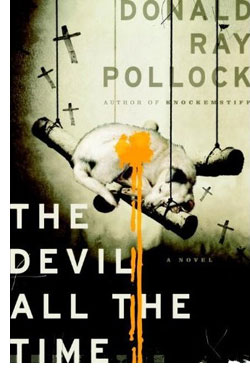 |
 |
 Donald Ray Pollock
Donald Ray Pollock
The Devil All the Time
Reviewed by: Rick Kleffel © 2011
Doubleday / Random House
US Hardcover First Edition
ISBN 978-0-385-53504-5
Publication Date: 07-12-2011
263 Pages ; $26.95
Date Reviewed: 06-23-2011
Index:
General Fiction
Mystery
Horror
The things that make this country great also make it frightening — very frightening. Opportunity begets regret. Freedom creates monsters. The religions that inform our spiritual lives revel in the glory of what follows. Life in the here and now tends to be a hardscrabble battle for an ever-diminishing slice of happiness that comes from a within that is ever more rotted by our daily struggles. The power of a great novel is that it can turn all of this into a twisted beauty that celebrates those whom it destroys.
Arvin Eugene Russell is not a bad kid, but he's not lucky by any stretch of the imagination, and there is quite a bit of imagination at work in Donald Ray Pollock's 'The Devil All the Time.' Pollock's story of good characters, bad characters and worse creeping across the American mid-west is a powerhouse of page-turning southern gothic terror. Pollock knows that there is a beauty at the core of horror, an awe that transcends earthly concerns. But those earthly concerns are awfully powerful, and powerfully awful. They tend to grind up those who get caught in the gears.
Pollock's storyline is grain alcohol Americana. Arvin's father is a World War II vet traumatized by his experiences in the Pacific, and his mother is slowly dying of cancer. There's a homemade altar in the backwoods behind Arvin's cabin, a visiting duet of preachers in the church (one handles spiders, the other young men), a shady sheriff and a husband and wife whose vacations consist of trolling the highways for male hitchhikers who tend to meet an unfortunate fate.
On a prose level, Pollock writes with a clipped precision that is subtly stripped down. You won't notice unless you're looking for it, but Pollock knows how to carve every unnecessary word from every sentence he writes. While the landscape and people he describes are relentlessly realistic, there's a gothic visionary feel to the novel. This book is a pleasure to read. For a finely-written work of art, it's very much a page-turner, the sort of book that will keep you up late because Pollock's prose is beautifully polished and natural to read. Pollock has a deep, distinctive American prose voice.
The characters are a real achievement. This novel offers up a town full of folks so unpleasant you'd want to drive out of your way to avoid that town. What's astonishing that even the most repellant folks are quite entertaining to read about, and not in a prurient manner to simply find out how low they can go (lower than you'd imagine), but because Pollock simply lets them be on the page. As a reader, you know that these people are real and have consequence in their own world. Arvin, the protagonist of the novel, is strong enough to hold his own, hold our attention and engage our sympathy. Even the vermin can make us care about them, even though we know that they are not going to be redeemed.
Paired with the characters and the prose, the other vital component is Pollock's carefully layered plot. He manages to inject tension into the narrative without resulting to artifice. Steering between fate and free will, Pollock manages to keep us engaged from the first page to the last with lots of red herrings and side paths that ultimately lead to an unexpected but satisfying resolution. It sounds a lot easier than it proves to be, but Pollock never overdoes the cleverness of the story. This is America, a land of opportunity that cuts both ways. The abyss is always just around the corner, or in the mirror.
When we choose a book to read, we're engaged in more than self-entertainment. The investment that a book requires, and a good book pays off, that of time and attention, is also an act of self-definition. We redraw the borders of our identity. 'The Devil All the Time' keeps those borders strictly in America, and even if you are not American, you partake of a powerful vision of this country. Abstract values have real consequences in this novel, and the actuality of the consequences in the fiction ripple into the minds of those who experience it. Pollock's celebration of what he destroys offers readers a glimpse of depths within themselves that they can acknowledge and explore with a frisson of fear, but hopefully without any danger of drowning. Hopefully.
|
 |
|
|
 |
| |
Review Archive
All Reviews alphabetized by author.
General Fiction
Non-Genre, general fiction and literature.
Horror
Supernatural fiction, supernatural horror and non-supernatural horror.
Science Fiction
Science fiction, science fantasy, speculative fiction, alternate history.
Fantasy
Fantasy, surrealism and magic realism.
Mystery
Crime, thrillers, mystery, suspense.
Non-Fiction
Non-Fiction, True Crime, Forteana, Reference.
Poetry
|
|
 |
|




